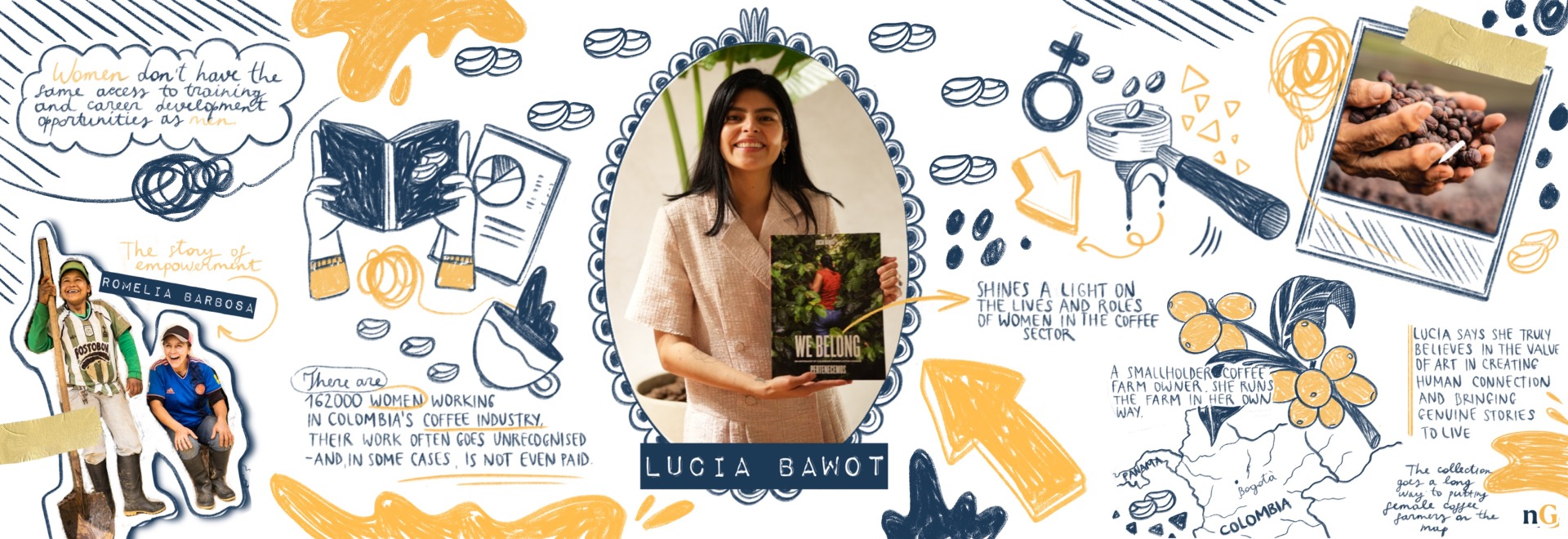The power of photography: Putting female coffee farmers on the map
Gabriella Oakley speaks with Lucia Bawot about her new photography book, ‘We Belong: An Anthology of Colombian Women Coffee Farmers’, and why reflecting the hard work of female coffee farmers is crucial to the future of the industry.
Despite women accounting for around 70% of the global coffee workforce, historically, leadership and decision-making in the industry have been dominated by men.
A new book by US-based Colombian photographer Lucia Bawot aims to challenge this disparity. We Belong: An Anthology of Colombian Women Coffee Farmers shines a light on the lives and roles of women in the sector that have gone largely unnoticed on the international stage.
According to Lucia, although there are 162,000 women working in Colombia’s coffee industry, their work often goes unrecognised – and, in some cases, is not even paid. “Colombian coffee is promoted as being produced by families or by men,” she says.
The inspiration for the book came when she realised her portfolio contained very few images of women. She spent 18 months visiting Colombia’s coffee-producing regions on foot and by motorbike, where she spoke with more than 60 female coffee farmers between the ages of 20 and 100. Many of their stories struck a chord, reminding her in particular of her grandmother, who was also a coffee farmer.
“I realised that all the stories my grandmother had been telling me since I was little were so similar to a lot of the stories of the women I visited,” she says. “They were close to my heart. So I wanted to honour her and I wanted to honour these women.”
Gender disparity in the coffee sector is not unique to Colombia. Women in other Latin American countries, and indeed across the world, are similarly under-represented in decision-making roles. They are less likely to be farm or land owners, and often don’t have the same access to training and career development opportunities as men.
Lucia believes the coffee sector should do more to address this. “There is a lot of potential for women to grow into leadership roles,” she explains, “and this would help the industry to grow.”
Stories of empowerment
While travelling around Colombia’s coffee-growing regions, Lucia was continually struck by the inspiring stories of the women she met.
Although many reflected the gender disparity and male dominance that she knew existed, there were also many that highlighted the incredible determination and strength of those against whom the odds were stacked.
One of them was Romelia Barbosa, a smallholder coffee farm owner from Sierra Nevada on Colombia’s Caribbean coast. She had suffered years of working almost without rest or pay, helping on the farm, cooking for the workers, raising a family, and doing odds and ends for her neighbours.
When her husband left the farm due to the civil war that was taking place in Colombia at the time, she took over and, today, she has full control and runs the farm successfully.
“Even though she was sad, it was also her freedom,” Lucia explains. “She was able to manage the farm in her own way. Now she is the leader, she is the boss. And she recognised that she deserved better.”
Gilma Cupaque from Tolima is another whose story stands out. Living in a remote indigenous community, she is determined to learn English so that she can directly foster relationships with potential buyers from afar.
When Lucia visited her, she found Gilma’s home covered with English words on post-it notes taken from online classes. “In Colombia, many people dream of learning English but not everybody can afford it or access the classes from the more remote areas of the country,” Lucia explains.
“Learning a language opens doors – it creates opportunities. Gilma showed me that if you want to do something, you can do it. She taught me that the sky’s the limit.”
The long road ahead
We Belong contains a wealth of stories just like Romelia and Gilma’s. There is Edith Enciso who won Colombia’s Cup of Excellence after banking her family’s future on coffee during armed conflict; Sara Goméz who took on the full responsibility of the farm aged just 14 after he father died; and many others who have found hope and success through adversity.
It is a fascinating collection that puts female coffee farmers at the centre of the conversation and lets their stories control the narrative. Its power stems from its authenticity: this isn’t a roaster or café using farmers to market their coffee, but rather a platform in and of itself to reflect a side of the coffee industry that is phenomenally important yet continually unrepresented.
Lucia says she truly believes in the value of art in creating human connection and bringing genuine stories to life. “It is vital if we are to articulate just how diverse this group of invisible producers is and make coffee more inclusive,” she says. “Art can capture stories, build bridges, and make us recognise our shared experience as humans.”
Although We Belong was around four years in the making, Lucia doesn’t feel her work is complete. The collection goes a long way to putting female coffee farmers on the map, but there is still a lot to be done before the industry can claim gender equality.
According to the International Coffee Organization, significant differences exist between men and women in their level of empowerment and their capacity to exercise agency. Until the gender gap is closed and women not only have the same opportunities as men but feel the same sense of belonging, then there is work to do.
“When we talk about diversity we talk about having a seat at the table, when we talk about inclusion, we talk about having a voice,” Lucia says. “But I think belonging is when you feel that that voice is being heard.”







